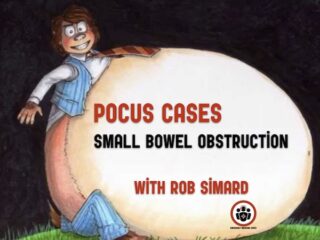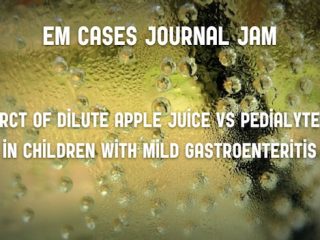Gastroenterology
POCUS Cases 5 – Small Bowel Obstruction
In this POCUS Cases 5 - Small Bowel Obstruction, Dr. Simard explains the limitations of x-rays for small bowel obstruction, the three signs of small bowel obstruction on POCUS including the "keyboard sign", the most important literature on the topic and the limitations of using POCUS for the diagnosis of small bowel obstruction...
Episode 102 GI Bleed Emergencies Part 2
In Part 2 of our two part podcast on GI Bleed Emergencies Anand Swaminathan and Salim Rezaie kick off with a discussion on the evidence for benefit of various medications in ED patients with upper GI bleed. PPIs, somatostatin analogues such as Octreotide, antibiotic prophylaxis and prokinetics have varying degrees of benefit, and we should know which ones to prioritize. We then discuss the usefulness of the Glasgow-Blatchford and Rockall scores for risk stratification and disposition of patient with upper GI bleeds and hit it home with putting it all together in a practical algorithm. Enjoy!
Episode 101 GI Bleed Emergencies Part 1
In this Part 1 of our two part podcast on GI bleed emergencies we answer questions such as: How do you distinguish between an upper vs lower GI bleed when it's not so obvious clinically? What alterations to airway management are necessary for the GI bleed patient? What do we need to know about the value of fecal occult blood in determining whether or not a patient has a GI bleed? Which patients require red cell transfusions? Massive transfusion? Why is it important to get a fibrinogen level in the sick GI bleed patient? What are the goals of resuscitation in a massive GI bleed? What's the evidence for using an NG tube for diagnosis and management of upper GI bleeds? In which patients should we give tranexamic acid and which patients should we avoid it in? How are the indications for massive transfusion in GI bleed different to the trauma patient? What are your options if the bleeding can't be stopped on endoscopy? and many more...
Episode 89 – DOACs Part 2: Bleeding and Reversal Agents
In this Part 2, DOACs Bleeding and Reversal we discuss the management of bleeding in patients taking DOACs with minor risk bleeds, like epistaxis where local control is easy to access, moderate risk bleeds, like stable GI bleeds and high risk bleeds, like intracranial hemorrhage. We answer questions such as: How do we weigh the risks and benefits of stopping the DOAC? When is reversal of the DOAC is advised? How best do we accomplish the reversal of DOACs? Is there any good evidence for the newest reversal agent? When should we stop DOACs for different procedures, and when should we delay the procedure?
Journal Jam 8 – Dilute Apple Juice for Pediatric Gastroenteritis
This is EM Cases Journal Jam podcast on a randomized control trial of dilute apple juice vs PediaLyte for mild pediatric gastroenteritis. While IV rehydration is required in cases of severe gastroenteritis (which we rarely see in North America) and oral rehydration with electrolyte maintenance solutions is still the mainstay in treating moderate gastroenteritis, could better-tasting, more cost-effective fluids such as diluted apple juice be just as effective as traditional electrolyte solutions in milder cases? Listen to Dr. Justin Morgenstern (@First10EM) interviewing Dr. Stephen Freedman, the world-renowned pediatric EM researcher who put ondansetron for pediatric gastroenteritis on the map and who was one of our guest experts on our main episode on Pediatric Gastroenteritis, Constipation and Bowel Obstruction, about this practice-changing paper. This is followed by a hilarious rant on the topic from Dr. Anthony Crocco ("Ranthony"), the Division head and medical director of pediatric EM at Hamilton Health Sciences.
Best Case Ever 51 – Anticoagulants and GI Bleed with Walter Himmel
In anticipation of Episode 88 and 89: DOACs Use, Misuse and Reversal with the president of Thrombosis Canada and world renowned thrombosis researcher Dr. Jim Douketis, internist and thrombosis expert Dr. Benjamin Bell and 'The Walking Encyclopedia of EM' Dr. Walter Himmel, we have Dr. Himmel telling us the story of his Best Case Ever on anticoagulants and GI bleed. He discusses the most important contraindication to DOACs, the importance of not only attempting to reverse the effects of anticoagulants in a bleeding patient but managing the bleed itself as well as more great pearls. In the upcoming episodes we'll run through 6 cases and cover the clinical use of DOACs, how they work, safety, indications, contraindications, management of minor, moderate and severe bleeding, the new DOAC reversal agents, management of DVT with DOAC anticoagulants, stroke prevention in atrial fibrillation with DOACs and much more...







